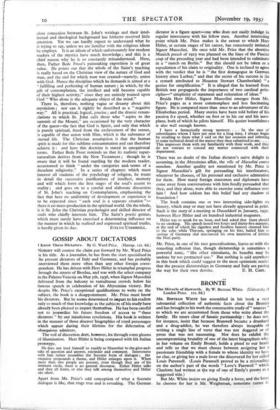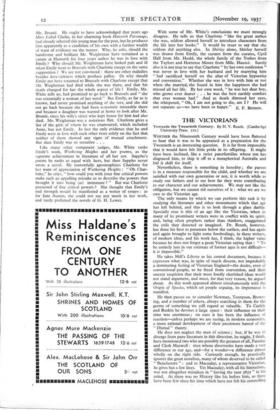BRONTE
MR. BERTRAM WHITE has assembled in his book a very substantial collection of authentic facts about the Brontes and has brought to his work the constructive study of " sources " to which we are accustomed from those who write about the family. He steers clear of fanatic partisanship : he does not, for instance, insist that because Branwell became a drunkard and a drug-addict, he was therefore always incapable of writing a Single line of verse that was not doggerel or of prose that was not nauseating. Nor does he exhibit the uncompromising brutality of one of the latest biographers who, in her volume on Emily Brontë, holds a pistol to our heads and tells us that we must choose between assigning her a passionate friendship with a female to whose identity we have no clue, or giving her a male lover she discovered for her called Louis Parensell. (Louis Paransell proved to be a misreading on the author's part of the words " Love's Farewell " which Charlotte had written at the top of one of Emily's poems as a suggested title.)
But Mr. White insists on giving Emily a lover, and the lover he chooses for her is Mr. Weightman, sometime curate tc Mr. Brontë. He ought to have acknowledged that years ago Miss Isabel Clarke, in her charming book Haworth Parsonage, had already selected this young man for the post, but he produces him apparently as a candidate of his own with a further wealth of want of evidence on the matter. Why, he asks, should the handsome and brilliant Mr. Weightman have remained as a curate at Haworth for four years unless he was in love with Emily ? Why should Mr. Weightman have looked pale and ill when Emily went to Brussels with Charlotte except on the same supposition ? We are not convinced : there are other maladies besides love-sickness which produce pallor. Or why should Emily not have returned to Brussels with Charlotte except that Mr. Weightman had died while she was there, and that his death changed for her the whole aspect of life ? Emily, Mr. White tells us, had promised to go back to Brussels and " she was essentially a woman of her word." But Emily, as far as is known, had never promised anything of the sort, and she did not go back because she had been extremely miserable there and because a daughter was wanted at home to look after Mr. Bronte, since his wife's sister who kept house for hini had also died. Mr. Weightman was a notorious flirt. Charlotte gives a list of the girls of whom he was enamoured, which included Anne, but not Emily. In fact the only evidence that he and Emily were in love with each other rests solely on the fact that neither of them showed any signs of mutual attachment. But then Emily was so secretive . . .
Like many other competent judges, Mr. White ranks Emily's work, Wuthering Heights and her poems, as the supreme achievement in literature of all her sex. Sappho's poems he ranks as equal with hers, but then Sappho never wrote a novel. He sorrowfully apostrophises Charlotte for her want of appreciation of Wuthering Heights : " Oh Char- lotte," he cries, " how could you with your fine critical powers make such an appalling mistake as to describe the powers that brought it into being (as) immature ? " But was Charlotte possessed of fine critical powers ? She thought that Emily's real strength would be manifested as a writer of essays : as for Jane Austen, she could not see any merit in her work, and vastly preferred the novels of G. H. Lewes. With some of Mr. White's conclusions we must strongly disagree. He tells us that Charlotte " like the great author she was, seldom allowed herself to introduce characters from the life into her books." It would be truer to say that she seldom did anything else. In Shirley alone, Shirley herself; was drawn from Emily, the curates from the curates, Cyril Hall from Mr. Heald, the whole family of the Yorkes from the Taylors and Hortense Moore from Mlle. Hausse. Surely also it is not true to say that Charlotte " by her own confession " was never in love with her husband and by marrying him " had sacrificed herself on the altar of Victorian hypocrisy and convention." Whether she was in love with him or not when she married, she found in him the happiness she had missed all her life. By her own word, " he was her dear boy, who grows ever dearer . . . he was the best earthly comfort that ever woman had." And as death dimmed her eyes, she whispered, " Oh, I am not going to die, am I ? He will not separate us—we have been so happy." E. F. BENSON.

















































































































 Previous page
Previous page